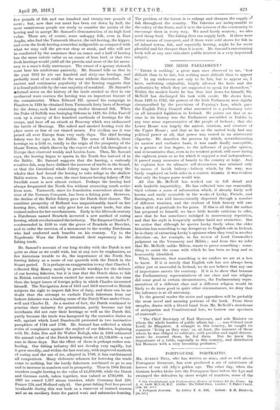THE IRISH PARLIAMENT.*
" THERE is nothing,' a great man once observed to me, ' less difficult than to be fair, but nothing more difficult than to appear so.' In my endeavour not only to be fair, but to appear so, I have, eschewing originality, largely allowed the facts and the authorities by which they are supported to speak for themselves." Within the modest limits he has thus laid down for himself, Mr. McNeill has discharged his task with credit. He shows how, from 1495 to 1782, the powers of the Irish Parliament were rigidly circumscribed by the provisions of Poyriing's Law, which gave the English Privy Council what amounted to a preliminary veto on all intended legislation in Ireland. He points out that at no time in its history was the Parliament assembled at Dublin in any true sense representative of the people of Ireland ; that tho Lower House was largely the mirror, creation, and creature of the Upper House ; and that so far as the united body had any political power at all, that power was vested in an aristocratic oligarchy. He describes the process by which, notwithstanding its narrow and exclusive basis; it was made finally susceptible, in a greater or less degree, to tho influence of popular opinion, and demonstrates that, even in its weakest period, still more during the eighteen years or so for which it enjoyed a real independence, it passed many measures of benefit to the country at large. Anil he explains how its ultimate self-destruction was attained only by means of lavish bribery—bribery which, by the way, was freely employed on both sides in a contest wherein it was evident that only the longer purse would win.
All this Mr. McNeill has worked out in full detail and with laudable impartiality. Ho has collected into one reasonably sized volume a mass of information which, if already fairly well known and easily accessible in the works of Lecky, Fronde, and Barrington, was still inconveniently dispersed through a number of different treatises, and the student of Irish history will owe him a debt of gratitude for his pains. If this is all that the author has proposed to himself, we have little hostile criticism to offer, save that he has sometimes indulged in unnecessary repetition, and that his style is frequently neither lucid nor attractive. But we notice that although he quotes Lecky freely when the elder historian has something to say derogatory to English rule in Ireland, he is chary of extracting Lecky's opinions when they tend in another direction—as, for example, in his review of Lord Cornwallis's judgment on the Yeomanry and Militia ; and from this we infer that Mr. McNeill, unlike Milton, wants to prove something : some- thing to assist the cause with which he has been so long and so honourably identified.
What, however, that something is we confess we are at a loss to know. If it is merely that English rule has not always been either just or successful in Ireland, we do not believe that any one of importance asserts the contrary. If it is to show that because the Parliamentary representatives of one class and one religion did some good in certain circumstances, the Parliamentary repre- sentatives of a different class and a different religion would be likely to do more good in quite other circumstances, we deny that the inference is at all necessary.
To the general reader the notes and appendices will be probably the most novel and amusing portions of the book. From 'these samples, drawn with a liberal hand from Mr. McNeill's storehouse of antiquarian and Constitutional lore, we borrow one specimen of statecraft :- " The Chief Secretary of Earl Harcourt, and sole Minister on whom the whole burden of public affairs lay . . . was Colonel (now Lord) de Blaquiere. A stranger in this country, he caught its manners ' living as they rose,' or, at least, the manners of those whom he was obliged to cultivate, with peculiar and rapid discern- ment—he courted them, he fed them. But he knew the importance of a table, especially in this country, and distributed his Marsoux with a very becoming profusion."


























 Previous page
Previous page